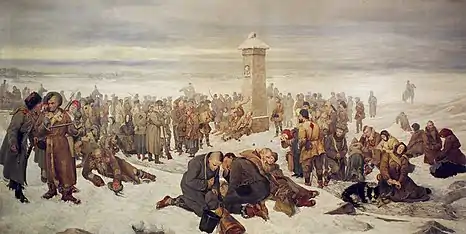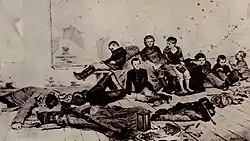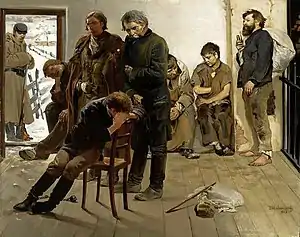Sybirak
A sybirak (Polish: [sɨˈbirak], plural: sybiracy) is a person resettled to Siberia.[1] Like its Russian counterpart sibiryák the word can refer to any dweller of Siberia, but it more specifically refers to Poles imprisoned or exiled to Siberia[2] or even to those sent to the Russian Arctic or to Kazakhstan[3] in the 1940s.

History




Russian and Soviet authorities exiled many Poles to Siberia, starting with the 18th-century opponents of the Russian Empire's increasing influence in the Polish–Lithuanian Commonwealth (most notably the members of the Bar Confederation of 1768-1772).[4] Maurice, Count de Benyovszky was deported and emigrated to Madagascar.
After Russian penal law changed in 1847, exile and penal labor (katorga) became common penalties for participants in national uprisings within the Russian Empire. This led to sending an increasing number of Poles to Siberia for katorga, when they then became known as Sybiraks. Some of them remained there, forming a Polish minority in Siberia. Most of them came from the participants and supporters of the November Uprising of 1830-1831 and of the January Uprising of 1863–1864,[5][6] from the participants of the 1905-1907 unrest[6] and from the hundreds of thousands of people deported as a result of the Soviet invasion of Poland in 1939.[6]
Around the late 19th century a limited number of Polish voluntary settlers moved to Siberia, attracted by the economic development of the region.[6] Polish migrants and exiles, many of whom were forbidden to move away from the region even after having finished serving their sentence, formed a vibrant Polish minority there.[6] Hundreds of Poles took part in the construction of the Trans-Siberian Railway.[6] Notable Polish scholars studied Siberia, such as Aleksander Czekanowski, Jan Czerski, Benedykt Dybowski, Wiktor Godlewski, Sergiusz Jastrzębski, Edward Piekarski (1858-1934), Bronisław Piłsudski, Wacław Sieroszewski, Mikołaj Witkowski and others.[6]
The term Sybiracy might also refer to former exiles, such as those who were allowed to return to Russian-held Poland following the amnesty of 1857 . The group, popular among the youth in the period preceding the outbreak of the January Uprising, supported the idea of organic work. However, during the January Uprising it ceased to exist as some of its members supported the Reds, while others supported the Whites. Among the most notable members of the group were Agaton Giller, Henryk Krajewski, Karol Ruprecht and Szymon Tokarzewski.[7]
About 20,000 Poles lived in Siberia around the 1860s.[6] An unsuccessful uprising of Polish political exiles in Siberia broke out in 1866.[6]
Soviet era
At the start of World War II the Soviets deported hundreds of thousands of Polish citizens, most of them in four mass waves. Some sources claim as many as 1.5 million deportees.[8][9][10][11][12][13][14] The most conservative figures[15][16] use recently found NKVD documents showing 309,000[17][18][19] to 381,220.[19][20]
Soviet authorities did not recognize ethnic Poles as Polish citizens.[18][21] In addition, some of the figures are based on those given an amnesty rather than those deported,[9][18] and not everyone was eligible for amnesty.[22] Therefore, figures based on official evidence might be an underestimation.[16][18][23][24]
References
- Stanisław Dubisz, ed. (2006). "Sybirak". Uniwersalny słownik języka polskiego (in Polish) (web ed.). Warsaw: PWN. p. 5426. ISBN 83-01-12837-2.
- Siberia and sybirak
-
"Sybir i Sybiracy" [Siberia and the Sybiracy]. www.emazury.com (in Polish). Związek Sybiraków - Oddział w Elblągu. Retrieved 2018-03-08.
Nazwa Sybiracy ma swój inny wymiar także dlatego, iż spora część zesłańców trafiła w inne rejony Rosji, które w żaden sposób Syberią nazwać nie można, np. do Kazachstanu. [...] The name "Sybiracy" has also it's different dimension because a considerable number of deportees landed in different parts of Russia, which in no way can be named "Siberia", for example in Kazakhstan.
- Norman Davies, Europe: A History, Oxford University Press, 1996, ISBN 0-19-820171-0, Google Print, p.664
- Dennis J. Dunn (2004). The Catholic Church and Russia: Popes, Patriarchs, Tsars, and Commissars. London: Ashgate Publishing. p. 57. ISBN 0-7546-3610-0.
- Jerzy Jan Lerski, Piotr Wróbel, Richard J. Kozicki, Historical Dictionary of Poland, 966-1945, Greenwood Publishing Group, 1996, ISBN 0-313-26007-9, Google Print, 538
- "sybiracy". Internetowa encyklopedia PWN (in Polish). Warsaw: PWN.
- Davies (1986), p. 451.
- Polian (2004), p. 119.
- Hope (2005), p. 29.
- "Holocaust: Five Million Forgotten: Non Jewish Victims of the Shoah". remember.org.
- Malcher (1993), pp. 8-9.
- Piesakowski (1990), pp. 50-51.
- Mikolajczyk (1948).
- "Magdeburg Sting 1936". minelinks.com.
- Piotrowski (2004).
- Gross (2002), p. xiv.
- Cienciala (2007), p. 139.
- Polian (2004), p. 118.
- "Lecture 17: Poland Under Occupation" (PDF). people.brandeis.edu/~nika.
- Applebaum (2004), p. 407.
- Krupa (2004).
- Rees (2008), p. 64.
- Jolluck (2002), pp. 10-11.
Bibliography
- Applebaum, A. (2004). GULAG A History, Penguin, ISBN 0-14-028310-2.
- Cienciala, M. (2007). Katyn A Crime Without Punishment, Yale University, ISBN 978-0-300-10851-4.
- Davies, N. (1986). God's Playground A History of Poland Volume II, Clarendon, ISBN 0-19-821944-X.
- Ferguson, N. (2006). The War of the World, Allen Lane, ISBN 0-7139-9708-7.
- Gross, J. T. (2002). Revolution from Abroad, Princeton, ISBN 0-691-09603-1.
- Hope, M. (2005). Polish Deportees in the Soviet Union, Veritas, ISBN 0-948202-76-9.
- Jolluck, K. (2002). Exile & Identity, University of Pittsburgh, ISBN 0-8229-4185-6.
- Krupa, M. (2004). Shallow Graves in Siberia, Birlinn, ISBN 1-84341-012-5.
- Malcher, G. C. (1993). Blank Pages, Pyrford, ISBN 1-897984-00-6.
- Mikolajczyk, S. (1948). The Pattern of Soviet Domination, Sampsons, low, Marston & Co.
- Piesakowski, T. (1990). The Fate of Poles in the USSR 1939~1989, Gryf, ISBN 0-901342-24-6.
- Piotrowski, T. (2004). The Polish Deportees of World War II, McFarland, ISBN 978-0-7864-3258-5.
- Polian, P. (2004). Against their Will, CEU Press, ISBN 963-9241-73-3.
- Rees, L. (2008). World War Two Behind Closed Doors, BBC Books, ISBN 978-0-563-49335-8.
External links
- Kresy-Siberia.org Kresy-Siberia Foundation and Virtual Museum dedicated to research, remembrance and recognition of Polish citizens exiled to the Soviet Union during World War II
- (in Polish) Zsyłki - rys historyczny
- (in Polish) Website dedicated to the Sybiraks
- Polish deportees in the USSR List compiled in 1941 by Tadeusz Romer, the Polish ambassador to Japan
Further reading
- M. Janik, Dzieje Polaków na Syberii, 1928
- W. Jewsiewicki, Na Syberyjskim Zesłaniu, 1959
- R. Lysakowski, Siberian Odyssey: A Song of the Cornucopia, Vantage Press, 1990, ISBN 0-533-08386-9
- Zygmunt Librowicz, Polacy w Syberji, 1884 (free online reading and download)